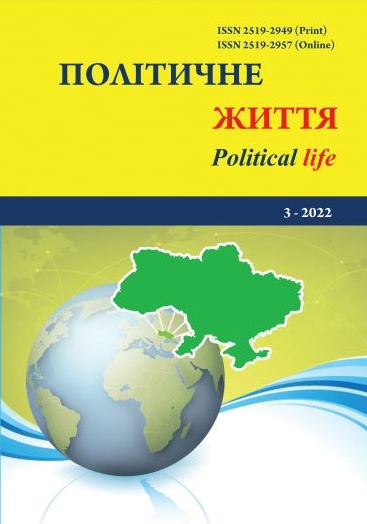Policing civil disorder in pandemic-driven Bulgaria
DOI:
https://doi.org/10.31558/2519-2949.2022.3.7Keywords:
Bulgaria; police; pandemic; civil disorder; protestsAbstract
The coronavirus pandemic and numerous restrictions introduced have fostered numerous gatherings and protest actions. Citizens expressed dissatisfaction with the restriction of their rights and freedoms, while at the same time demanding a solution to the problems that took place before the pandemic occurred. In Bulgaria, the problems included corruption, dissatisfaction with the government, and the failure to respect the independence of the judiciary. For this reason, from July 9, 2020 to April 16, 2021 there were protests of citizens who demanded, among others, changes and resignation of the government. The analysis will provide answers to two research questions: what actions did the protesters take between July 2020 and April 2021? How did the security services deal with civil disorder during the protests? The main research problem relates to the impact of repression on mobilization or demobilization and the use of violent actions by protesters. By delving into actions, the study will differentiate between violent and peaceful actions. In turn, by evaluating the security services’ actions, the study will differentiate between repressive and non-repressive protest policing. The method used in this study is the qualitative source analysis. It draws on the technique of content analysis of specifically media coverage of the activities of the police and protest participants during the indicated period. The analysis rests on the reports that appeared on the most important websites and Internet portals reporting on the course of the protests. Based on the analysis, it was found that the main demands and goals remained unchanged, the actions taken by the protesters included many types of violent and peaceful activities. On the side of the security services, a division was also made into repressive and non-repressive activities. The protests ended naturally with the end of the government’s term. Repressions had no impact on mobilisation and fuelled violent protests.
References
Rezmer-Płotka K. The Effects of Crises in the European Union as a Manifestation of the Militant Democracy Rule Implementation, Przegląd Prawa Konstytucyjnego, 2020, 6(58): 615–621. https://doi.org/10.15804/ppk.2020.06.50.
Rak J. and Bäcker R. (Eds.), Neo-militant Democracies in the Post-communist Member States of the European Union, 2022, London and New York: Routledge.
Loewenstein K. Militant Democracy and Fundamental Rights I, The American Political Science Review, 1937a, 3(31): 417–432; Loewenstein K. Militant Democracy and Fundamental Rights II, The American Political Science Review, 1937b, 4(31): 638–658.
Marszałek-Kawa J., The Institutional Position and Functions of the Sejm of the Republic of Poland after the Accession to the European Union, 2019, Odessa: Helvetica Publishing House.
Bäcker R., Rak J., Trajektoria trwania opancerzonych demokracji, Studia nad Autorytaryzmem i Totalitaryzmem, 2019, 41(3): 63–82.
Skrzypek M., The Banning of Extremist Political Parties as a Measures of Neo-Militant Democracy: The Experience of Post-Communist States, HAPSc Policy Briefs Series 2020, 1(2): 67–73. https://doi.org/10.12681/hapscpbs.26450.
Rak J. and Bäcker R., Editorial. Facing Zeitgeist: The World between Neo- and Quasi-militant Democracy, Polish Political Science Yearbook, 2021, 50(2): 5–8.
Rak J., Conceptualizing the Theoretical Category of Neo-militant Democracy: The Case of Hungary.” Polish Political Science Yearbook, 2020, 49(2): 61–70. https://doi.org/10.15804/ppsy2020204.
Rezmer-Płotka K., Contentious Politics in Defense of Neo-Militant Democracy in Poland: The Rationale Behind Fighting a Quasi-Militant Democracy, HAPSc Policy Briefs Series 2021, 2(1): 24–29. https://doi.org/10.12681/hapscpbs.27652.
Osiewicz P.,Limitations to the Right to Freedom of Assembly in Poland during the COVID-19 Pandemic: The Case of Women’s Strike, HAPSc Policy Briefs Series 2020, 1(2): 195–200. https://doi.org/10.12681/hapscpbs.26458.
Rezmer-Płotka K., Policy on Public Assemblies in Times of Crisis: Recommendations Concerning the Strategy of Militant Democracy, HAPSc Policy Briefs Series, 2020, 1(2): 201–207. https://doi.org/10.12681/hapscpbs.26459.
World Data, Corruption in Bulgaria URL: https://www.worlddata.info/europe/bulgaria/corruption.php.
Transparency International, Corruption PerceptionsIndex, URL: https://www.transparency.org/en/cpi/2019/index/nzl.
European Commission, The Corruption Perception Index 2019: The EU is the best performer in the world, URL: https://ec.europa.eu/regional_policy/en/newsroom/news/2020/01/27-01-2020-the-corruption-perception-index2019-the-eu-is-the-best-performer-in-the-world.
Brennan O’ John, URL: Bulgarians under the Yoke of Oligarchy. https://www.maynoothuniversity.ie/sites /default/files/assets/document/New_Left_Review_Bulgarians_under_the_Yoke_of_Oligarchy.pdf
Krasteva A, URL: Balgarskiyat populizam – shtrihi kam portreta. https://annakrasteva.wordpress.com/2013/ 12/23/bulgraian-populism/.
Brennan O’ John, URL: Bulgarians under the Yoke of Oligarchy. https://www.maynoothuniversity.ie/sites/ default/files/assets/document/New_Left_Review_Bulgarians_under_the_Yoke_of_Oligarchy.pdf
Antonov, S., The Age of the Oligarchs: How a group of political and economic magnates have taken control of Bulgaria, URL: https://reutersinstitute.politics.ox.ac.uk/sites/default/files/research/files/ The%2520Age%2520of%2520Oligarchs.pdf.
Antonov, S., The Age of the Oligarchs: How a group of political and economic magnates have taken control of Bulgaria, URL: https://reutersinstitute.politics.ox.ac.uk/sites/default/files/research/files/ The%2520Age%2520of%2520Oligarchs.pdf.
Earl J., Repression and social movements, [in:] The Wiley-Blackwell Encyclopedia of Social and Political Movements, [Eds.] David A. Snow, Donatella della Porta, Bert Klandermans, and Doug McAdam, 2013, Blackwell Publishing Ltd.
Ellefsen R., The Unintended Consequences of Escalated Repression, Mobilization – An International Quarterly, 2021, 26(1): 87-108.
Rak J., Repression and Blockupy Radicalization in Austerity-Driven Germany, Przegląd Zachodni, 2020, No. 2, p. 189-203.
Nassauer A., Effective crowd policing: empirical insights on avoiding protest violence, Policing: An International Journal of Police Strategies & Management, 38(1): 132-152.
Mix T., Lethal Repression of Peaceful Protest in Africa. Why Do (non-) Accountable and Military Regimes Shoot, Student Paper Series 15, 2014, URL: https://www.ibei.org/ibei_studentpaper15_71932.pdf.
Göbel C., The Political Logic of Protest Repression in China, Journal of Contemporary China, 30(128), p. 169-185.
Council of Europe. Bulgaria. Code of Ethics for Officials of the Ministry of the Interior with Police Functions. URL: https://policehumanrightsresources.org/content/uploads/2016/08/Code-Of-Ethics-For-Officials-OfThe-Ministry-Of-The-Interior-With-Police-Functions-2004.pdf?x19059.
Passavant A. P., Policing Protest, Duke University Press, Durham and London, 2021.
Davenport C., State Repression and Political Order, The Annual Review of Political Science, 2007, 10(1), s. 1–23.
Tarrow S., Strangers at the Gates. Movements and States in Contentious Politics, Cambridge University Press 2012.

